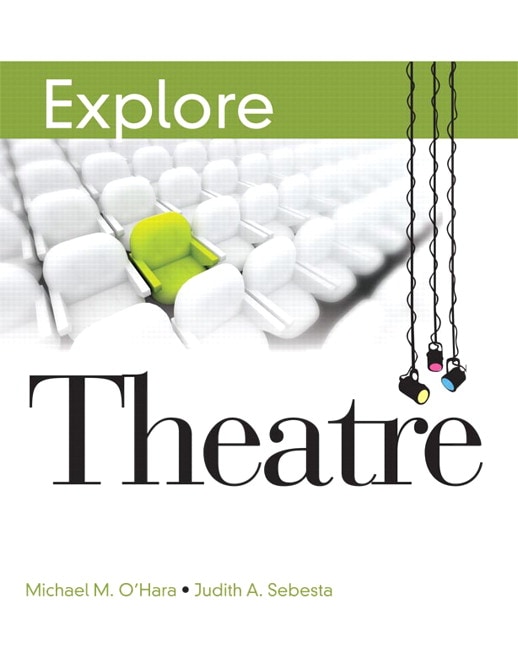
30.00$ - Purchase this E-book
Category : Higher Education
EXPLORE THEATRE: A BACKSTAGE PASS TABLE OF CONTENTS Part I: The Event Chapter 1: What Is Performance? Introduction Learning Objectives Characteristics All Performances Share Paradigm of Performance Purpose of Performance How Performances Differ Performance As Ritual Performance As Art Live and Mediated Theatrical Performances Performance of Self, Culture, History For Further Information Suggested Films Glossary Key Concepts Instructor Resources Practice Test Chapter 2: The Text Introduction Learning Objectives Reading and Analyzing a Play Aristotle’s Six Elements Plot Character Thought, or Theme Diction, or Language Music and Spectacle Genres Tragedy Comedy Melodrama Musical Theatre For Further Information Suggested Films Glossary Key Concepts Appendix A: Questions for Analyzing Plays Appendix B: Analyzing Scripts (Film, TV, and Stage) Instructor Resources Practice Test Chapter 4: Who Decides What Is Good Performance? Introduction Learning Objectives The Audience The Audience as Community The Audience in History In Sacred and Religious Theatres In Professional Theatres In Democratic Theatres In Non-Western Theatres The Critic The Theorist The Dramaturg Theatre as Business The Producer The Marketing Team The Agent For Further Information Suggested Films Glossary Key Concepts Instructor Resources Practice Test Chapter 5: Where Can Performance Be Done? Introduction Learning Objectives Theatre Configurations The Proscenium The Thrust The Arena The Flexible Space Other Spaces Producing Contexts Commercial: Broadway, Off-Broadway, and Tours Not-for-Profit: Off-Off-Broadway and Regional Theatre Amateur Theatre: Educational and Community Hybrids For Further Information Suggested Films Glossary Key Concepts Instructor Resources Practice Test Unit II: The People (Brief discussion of audience member as maker of meaning and how modern performances are constructed by performers and their audiences.) Chapter 6: Playwrights Introduction Learning Objectives The Playwright in History Types of Playwrights Playwriting Methods and Processes Training and the Profession For Further Information Suggested Films Glossary Key Concepts Instructor Resources Practice Test Chapter 7: Directors Introduction Learning Objectives What Is Directing? Working with the Text Working with the Designers Working with the Actors Coordinating the Production What Is Producing? Types of Directors Training and the Profession For Further Information Suggested Films Glossary Key Concepts Instructor Resources Practice Test Chapter 8: Scenic and Costume Designers Introduction Learning Objectives Scenic Designers History Materials, Methods and Processes Related Aspects: Props Costume Designers History Materials, Methods and Processes Related Aspects: Masks, Makeup, Wigs, and Hair Training and the Profession For Further Information Suggested Films Glossary Key Concepts Instructor Resources Practice Test Chapter 9: Lighting Designers, Sound Designers, and Technical Production Introduction Learning Objectives Lighting Designers History Materials, Methods and Processes Related Aspects: Assistants and Technicians Sound Designers History Materials, Methods and Processes Technical Production For Further Information Suggested Films Glossary Key Concepts Instructor Resources Practice Test Chapter 10: Actors Introduction Learning Objectives Acting Defined From Presentational … … to Representational … to Realism Acting Methods Emotional Memory to Intercultural Intercultural to Non-Western The Actor's Process The Audition The Rehearsal The Performance Acting for the Stage vs. Acting for the Camera The Profession For Further Information Suggested Films Glossary Key Concepts Instructor Resources Practice Test Unit III: The Types (Brief discussion of the major modes of performance.) Chapter 11: The Play Introduction Learning Objectives Elements of the Play in Context Classical and Medieval Antecedents Golden Ages Drama and the Advent of Illusionistic Stages Modern Drama A Script: Two Character Play For Further Information Suggested Films Glossary Key Concepts Instructor Resources Practice Test Chapter 12: Backstage at Two Character Play Introduction Learning Objectives Rehearsals Technical and Dress Rehearsals Pre-Show and Preparation The Performance The Program Part One Part Two Part Three The Run of the Show A Backstage Pass Glossary Key Concepts Appendix Instructor Resources Practice Test Chapter 13: Musical Theatre Introduction Learning Objectives Part One: The Broadway Musical Elements of the Musical Music Lyrics Libretto Antecedents The Birth of the Modern Musical The Golden Age of Musical Theatre Beyond the Golden Age The British Invasion The Broadway Musical Today Part Two: Asian Music Theatre Sanskrit Theatre Beijing Opera Noh Kabuki For Further Information Suggested Films Glossary Key Concepts Appendix Instructor Resources Practice Test Chapter 14: The Cinematic Experience Introduction Learning Objectives From Stage to HD Video Adaptation (video) Casting (video) Directing (video) The Artists of Film Producers and Directors (video) Actors (video) Lights (videos) Costumes (video) Crew (video) The Film Finale (adaptation of Two Character Play) (video) Theatre and Film Explored: A Documentary of Intersection (video) For Further Information Suggested Films Glossary Key Concepts Instructor Resources Practice Test Chapter 15: Popular Entertainments Introduction Learning Objectives Mime and Pantomime Roman Paratheatricals Tournaments Commedia Dell’arte Vaudeville Circus Puppetry Concerts Stand-Up Comedy Magicians and the Art of Illusion For Further Information Suggested Films Glossary Key Concepts Instructor Resources Practice Test Table of Contents
Dance
Get Explore Theatre -- Standalone Access Card by Michael M. O'Hara Judith A. Sebesta


0 commentaires:
Enregistrer un commentaire